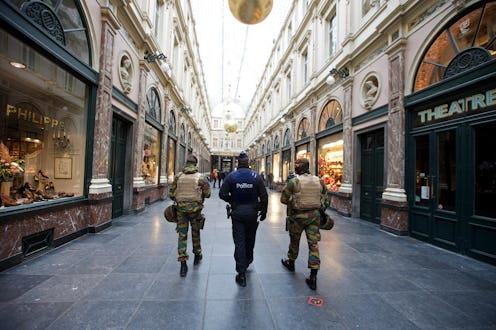News
High Profile Sites In Brussels
Brussels remains on lockdown for the third day Monday, as raids continue in the hunt for Salah Abdeslam, the Belgian national on the run who was implicated in the Nov. 13 Paris terrorist attacks. But why Brussels? The capital of Belgium is relatively small city, with a metro population of 1.8 million people (compared with Greater Paris' 12 million, for example). Yet despite its small size, the city maintains an outsize influence on the world stage. The many European and international institutions in Brussels explain why any terrorist threats are taken so seriously.
The security threat remains set at the highest level of four in the city, and Belgian Prime Minister Charles Michel said that threats against the region were "serious and imminent." Overnight, 19 raids resulted in 16 arrests, in an attempt to thwart a Paris-style attack in the city. The prime minister said Sunday that "relatively precise" information warned that "a number" of individuals could launch attacks on several locations in the city simultaneously.
Schools, universities, some embassies, and the Brussels subway system are closed for the day. Concerts, soccer games, and outdoor markets were canceled; some big stores closed as well. The public has been asked to stay at home, avoid crowds if they must go out, and comply with security checks.
But interestingly, the big institutions that make Brussels so notable, and a popular target for terrorists, will remain open. Thought of as the de facto capital of Europe, Brussels is home to the likes of the European Union and NATO. Important politicians and diplomats fly in from around the world for high-level talks. Even on Monday, these will continue, as Eurozone finance ministers will meet as planned, albeit with raised security. While less known than London or Paris, Brussels is home to many of the institutions that underpin Western and European power.
NATO Headquarters
The headquarters of the North Atlantic Treaty Organization are on the northeast perimeter of the city. The national delegations of the 28 member countries meet there, and the North Atlantic Council, the group's decision-making body, is based there. A new headquarters, also in Brussels, is under construction.
The European Commission
The executive body of the European Union, the European Commission, is based at the Berlaymont building in Brussels' European district. The commission is responsible for proposing and implementing Europe-wide legislation, managing daily business of the 28-state group, and upholding the treaties among member countries that created the bloc's legal structure.
The Council Of The European Union
The council is made up of ministers of the 28 national EU governments, and is located in Brussels' European district as well. If its meeting is on agriculture, the agriculture ministers of all 28 governments come to Brussels to meet. The presidency rotates every six months among the 28 countries. Most recently, justice and home affairs ministers agreed on new rules to fight terrorism, like compiling a database of airline passenger records and strengthening borders.
The European Council
Surprisingly, it's not the same as the Council of the European Union. This body is made up of the heads of state of the 28 member countries, such as Francois Hollande and David Cameron. They also meet in Brussels, at the Europa building in the European quarter. It is headed by a president who is appointed by EU countries. Currently, former Polish Prime Minister Donald Tusk heads the group.
The European Parliament
The Parliament is made up of 751 members voted in by European citizens — the only European Union body that is directly elected. It meets in both Brussels and Strasbourg, France. The Parliament works with the European Council to create legislation, and it oversees the European Commission.
The Royal Palace Of Brussels
With so many European and international bodies located in Brussels, it might be easy to forget that the Belgian Monarchy is located in the city. The royals, King Philippe and Queen Mathilde, actually live on the outskirts of the city, but the main Royal Palace is smack dab in the center of the city.
